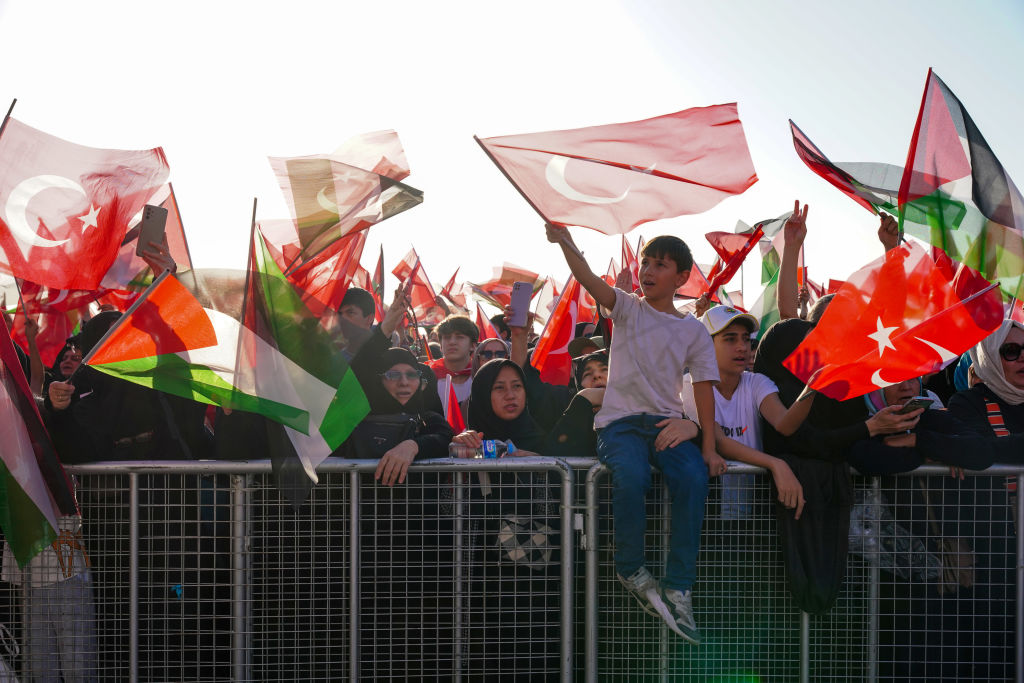Truthout is a vital news source and a living history of political struggle. If you think our work is valuable, support us with a donation of any size.
The day after Israel unleashed its most intensive bombing campaign against Gaza since October 7, hundreds of thousands of protesters marched in cities around the world calling for a cease-fire and the protection of Palestinian lives.
Gaza lost all telephone and internet communication Friday night as Israeli officials said the country had entered the “next stage” of the war on Saturday as it expanded its operations on the ground.
“[L]ast night Israel launched a major bombardment and cut off all communications. This is an act of pure barbarism,” Ben Jamal, the director of Palestine Solidarity Campaign (PSC), told Middle East Eye from a march in London. “So we are marching today, not knowing how many Palestinians are dead, how many children now lie under the rubble.”
PSC estimated on social media that half a million people attended the London march, which went from Embankment past U.K. Prime Minister Rishi Sunak’s official residence at Downing Street to Westminster. Aerial footage showed streets and bridges thick with crowds. Sunak has stopped short of calling for a cease-fire, and Great Britian has emphasized Israel’s right to defend itself after the surprise October 7 attack by Hamas that killed around 1,400.
“The superpowers at play are not doing enough at the moment. This is why we’re here: we’re calling for a cease-fire, calling for Palestinian rights, the right to exist, to live, human rights, all our rights,” London marcher Camille Revuelta told Reuters. “This is not about Hamas. This is about protecting Palestinian lives.”
Protests also took place in cities across Europe, the Middle East, and Asia, including what +972 Magazine journalist Oren Ziv said was the first anti-war protest in Tel Aviv.
Israeli officials said Saturday they had expanded their ground operations in Gaza after smaller raids Wednesday and Thursday night, while Hamas promised to meet them with “full force,” Al Jazeera reported.
Prime Minister Benjamin Netanyahu said Saturday night that Israel had entered the “second stage” of the war with an expanded ground operation, according to The Associated Press.
He said the goals of the incursion were “to destroy the military and governmental capabilities of Hamas and bring the hostages home.”
Friday’s bombardment was heavy enough to cut most forms of communications to Gaza, leaving families, aid organizations, and news rooms unable to reach their loved ones or staff. Al Jazeera journalist Hani Mahmoud succeeded in reporting Saturday morning that Friday night had been “the most difficult and bloodiest night since the beginning of this war.”
Mahmoud said Israel launched a major attack around 7 pm local time Friday near al-Shifa hospital in the north of Gaza and that “we have been hearing reports that hundreds of people have been killed in those areas and emergency services were not able to get to them in time to help.”
“The problem with cutting Gaza from the outside world has made people feel it could be a genocide in the making without them knowing what has happened to their relatives,” Mahmoud said.
The Gaza Health Ministry reported 377 more deaths since late Friday night, according to AP. The total death toll is now at more than 7.703 killed in Gaza, 3,595 of them children, Al Jazeera reported.
“The most important thing for us is for them to stop killing kids. They need to stop,” Abdul Mahfuudi, who joined the London protest with his own children, told BBC News.
Saturday marked the third weekend in a row of Palestine solidarity marches across the U.K. Demonstrators also rallied in Manchester, Belfast, and Glasgow, among others.
Beyond the U.K., crowds marched for a cease-fire in Copenhagen; Rome; Stockholm; Istanbul; Wellington, New Zealand, and Kuala Lumpur, Malaysia, Reuters reported.
In Turkey, President Recep Tayyip Erdogan repeated his denials that Hamas a terrorist organization and said that Israel was an “occupier,” according to Al Jazeera.
“The main culprit behind the massacre unfolding in Gaza is the West,” he said.
Despite bans, a small group of protesters also gathered in Paris and thousands marched in Berlin, according to Reuters and Al Jazeera.
A terrifying moment. We appeal for your support.
In the last weeks, we have witnessed an authoritarian assault on communities in Minnesota and across the nation.
The need for truthful, grassroots reporting is urgent at this cataclysmic historical moment. Yet, Trump-aligned billionaires and other allies have taken over many legacy media outlets — the culmination of a decades-long campaign to place control of the narrative into the hands of the political right.
We refuse to let Trump’s blatant propaganda machine go unchecked. Untethered to corporate ownership or advertisers, Truthout remains fearless in our reporting and our determination to use journalism as a tool for justice.
But we need your help just to fund our basic expenses. Over 80 percent of Truthout’s funding comes from small individual donations from our community of readers, and over a third of our total budget is supported by recurring monthly donors.
Truthout’s fundraiser ended last night, and we fell just short of our goal. But your support still matters immensely. Whether you can make a small monthly donation or a larger one-time gift, Truthout only works with your help.
